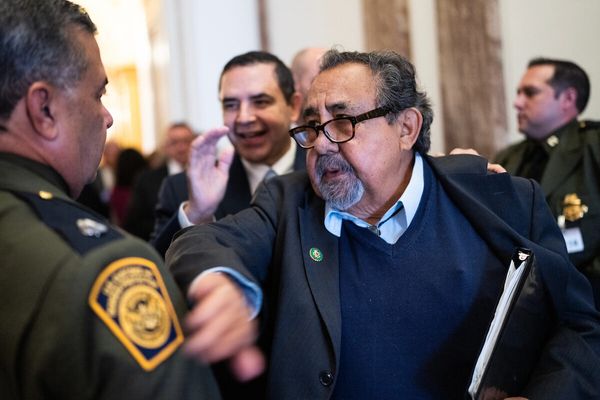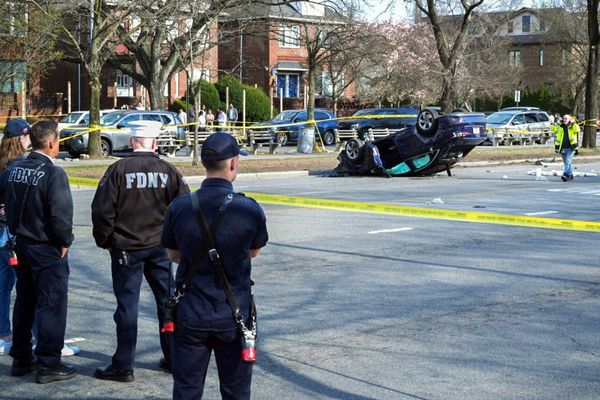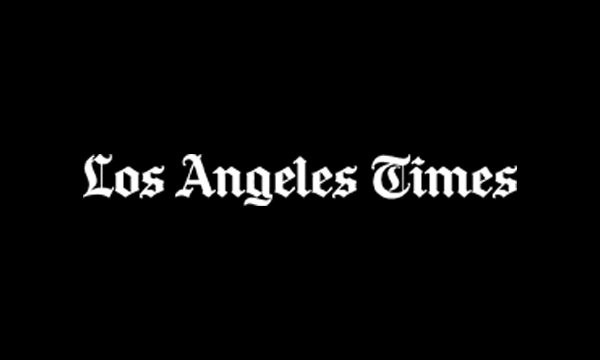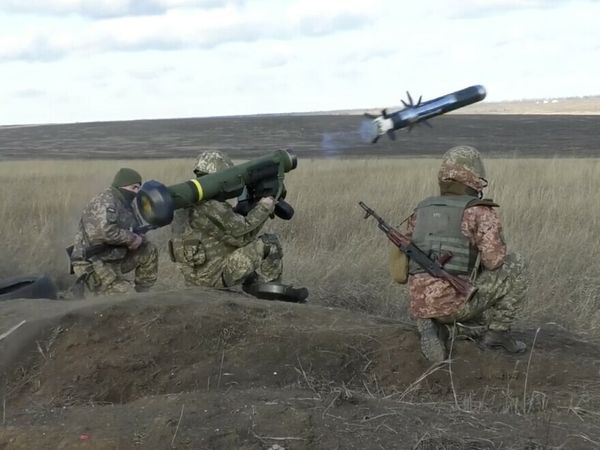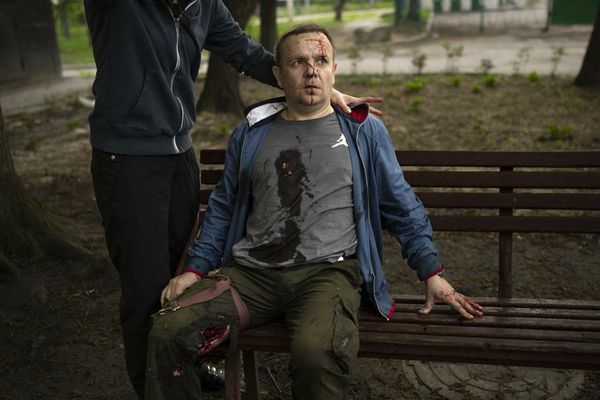DNIPRO, Ukraine — Russia is “exerting intense fire” along a 300-mile battlefront in Ukraine’s east, the embattled nation’s military said Thursday, as the head of the United Nations landed in Kyiv for a high-profile visit amid escalating threats by Moscow to cut off energy supplies to more European countries.
Ukraine said it intercepted attacks in the eastern Donetsk and Luhansk regions, while Russia’s Defense Ministry made unverified claims that it had struck overnight at military targets in Barvinkove and Ivanivka, settlements in the Kharkiv region, which has been the site of near-constant shelling over more than two months of war.
The growing Russian assaults, now shifted away from Kyiv as Moscow tries to secure a large swath of land across southern and eastern Ukraine, come as hostilities reach new levels not only on the ground but diplomatically.
Russia, under economic sanctions by dozens of nations and facing a U.S.-led partnership of more than 40 countries that vowed this week to increase arms supplies to Ukraine, has suggested it may cut off gas exports to more states after suspending shipments to Poland and Bulgaria on Wednesday.
In an overnight address, Ukrainian President Volodymyr Zelenskyy echoed cries of Russian “blackmail” against European nations, which together with the U.S. have sent billions of dollars of weaponry and aid to humanitarian groups and front-line fighters to Ukraine.
Moscow “is just waiting for the moment when one or another trade area can be used to blackmail Europeans politically, or to strengthen Russia’s military machine, which sees a united Europe as a target,” Zelenskyy said.
Ahead of a meeting with the Ukrainian leader Thursday, U.N. Secretary-General Antonio Guterres, who visited the war-torn town of Borodyanka, outside Kyiv, described the war as “an absurdity in the 21st century.”
Guterres traveled to Kyiv, the Ukrainian capital, two days after calling on Russian President Vladimir Putin in Moscow for a meeting at which the two leaders agreed “in principle” on evacuations for civilians trapped in a vast steel plant in the southern port city of Mariupol. Ukraine has not confirmed any new evacuations in the besieged city, which Russia has otherwise largely overtaken
Speaking to CNN ahead of his arrival in Ukraine, Guterres said it was Russia’s responsibility to stop the war.
“The war will end when the Russian Federation decides to end it and when there is — after a cease-fire — a possibility of a serious political agreement. We can have all the meetings, but that is not what will end the war,” he said.
Meanwhile, the death toll — estimated in the tens of thousands between Ukrainian and Russia civilian and military losses — continued to climb.
The regional governor in Luhansk, Serhiy Haidai, said Thursday that four people were killed in strikes over the previous day, including an 85-year-old who died after a hospital was hit in Severodonetsk. Writing on the messaging app Telegram, he said dozens of residents had fled the towns of Lysychansk and Popasna since Wednesday.
In Donetsk, regional military administration leader Pavlo Kyrylenko said on Telegram that 27 houses in the village of Lastochkine were destroyed in the latest attacks. Kyrylenko did not list any casualties.
Despite the fighting, some parts of Ukraine, in particular central and western areas, have maintained a relative sense of normality amid air-raid sirens as residents remain on alert of war.
In Dnipro, in central Ukraine, the business of everyday life appeared to continue Thursday without much disruption. The streets were full of cars, pedestrians walked through the parks to get to their workplaces, and trams and buses operated normally. Outside the city, where the buildings gave way to wide swaths of farmland, tractors dug fresh furrows in fields covered with Ukraine’s characteristic black soil, while other workers prepared the land for the coming harvest.
Fears of the war spilling beyond Ukraine’s borders have increased.
Strikes were reported this week in Transnistria, a pro-Russia breakaway region in Moldova that’s northwest of the Ukrainian city of Odesa. The Transnistria government, which has thousands of Russian troops stationed on its soil, has accused Ukraine of being behind the aggression. Ukraine has said the explosions, which hit the territorial capital of Tiraspol, were a “planned provocation” by Russia.
Ukraine has also shied away from taking responsibility for a handful of attacks across its eastern border on Russian targets while proclaiming that it has the right to strike on its adversary’s soil if necessary.
“Ukraine will defend itself in any way, including strikes on the warehouses and bases of the killers in Russia,” Mykhailo Podolyak, an adviser to Zelenskyy, said in a tweet.
Speaking to reporters Thursday, Russian Foreign Ministry spokeswoman Maria Zakharova said attacks within Russia “cannot remain without answer” and would be met with “harsh response.”
Zakharova also suggested that Kyiv — which a bevy of international leaders, including the U.S. secretaries of State and Defense, have recently visited, and where the U.S. said it would reestablish its embassy — would again become a target.
“Advisers from Western countries staying in Ukraine’s decision-making centers will not necessarily be a problem for Russia’s response measures. We do not advise to continue trying our patience,” she said.
President Joe Biden, who has announced more than $3 billion in materiel and humanitarian aid to Ukraine since the war began, is scheduled to give a speech Thursday on the crisis that has become a central foreign policy issue of his term. A White House spokesman said Biden would share “remarks on support for Ukrainians defending their country and their freedom against Russia’s brutal war.”
The war, which has sent more than 5 million Ukrainians fleeing into neighboring nations and left more than 8 million internally displaced, has also rocked natural gas prices in Europe. Russia, the world’s second-largest gas producer, supplies a sizable share of Europe’s gas and was scheduled to substantially increase those shipments before it invaded Ukraine on Feb. 24. The U.S. imposed a ban on Russian oil and gas last month, but the issue has been more contentious in European nations such as Germany that heavily depend on Russian natural gas.
According to a new World Bank report, the war is likely to have long-term effects on energy costs and wheat prices, as Russia and Ukraine are major producers of the grain.
In a tweet Thursday, Podolyak called on nations to further isolate Russia through energy bans.
“It’s a matter of time before an embargo on Russia energy will be imposed. Refusal of oil is not only about moral responsibility, but also about calculation: Russia has ceased to be a reliable and predictable partner in the eyes of the world, so the world can’t afford to depend on it,” he said.
“Switching to alternative supply channels quickly will be expensive, but not as expensive as not doing so. In the medium term, Moscow will face total economic and political isolation. As a result, poverty, the scale of which Russia has not seen yet.”
____
(Bulos reported from Dnipro and Kaleem from London.)


